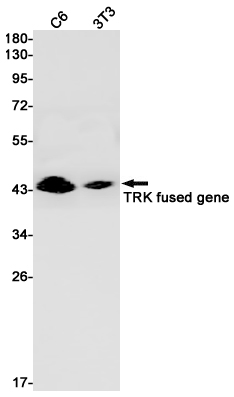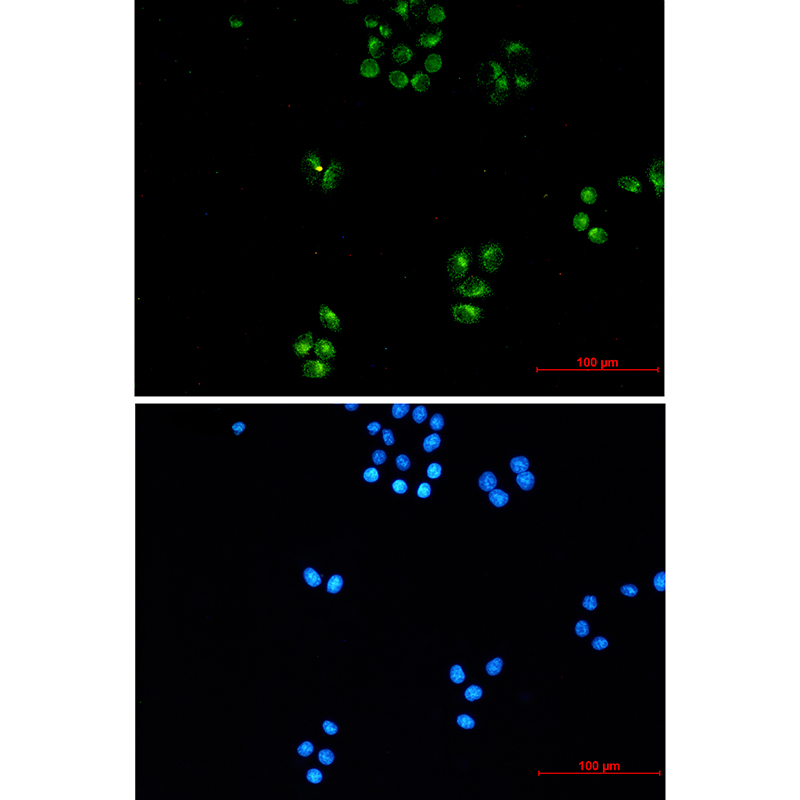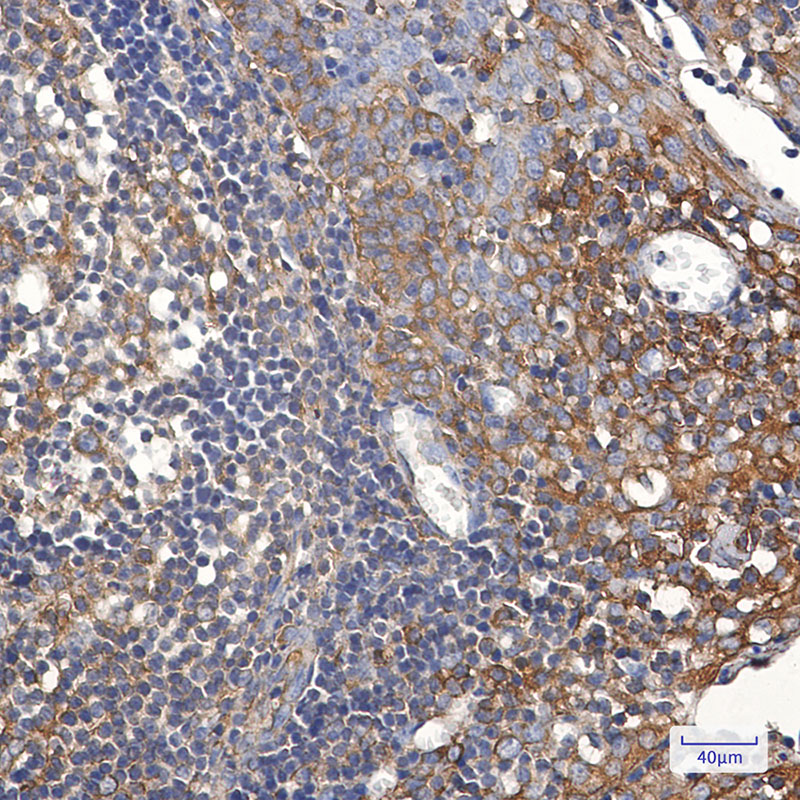


| WB | 1/500-1/1000 | Human,Mouse,Rat |
| IF | 咨询技术 | Human,Mouse,Rat |
| IHC | 1/50-1/100 | Human,Mouse,Rat |
| ICC | 1/50-1/200 | Human,Mouse,Rat |
| FCM | 咨询技术 | Human,Mouse,Rat |
| Elisa | 咨询技术 | Human,Mouse,Rat |
| Aliases | TF6; HMSNP; SPG57; TRKT3 |
| Entrez GeneID | 10342 |
| WB Predicted band size | Calculated MW: 43 kDa; Observed MW: 43 kDa |
| Host/Isotype | Rabbit IgG |
| Antibody Type | Primary antibody |
| Storage | Store at 4°C short term. Aliquot and store at -20°C long term. Avoid freeze/thaw cycles. |
| Species Reactivity | Human,Mouse,Rat |
| Immunogen | A synthetic peptide of human TRK fused gene |
| Formulation | Purified antibody in TBS with 0.05% sodium azide,0.05%BSA and 50% glycerol. |
+ +
以下是关于TFG抗体的3篇参考文献及其摘要:
1. **文献名称**:*TFG facilitates interferon signaling and suppresses tumorigenesis in breast cancer*
**作者**:Wang, X., et al.
**摘要**:该研究揭示了TFG蛋白在乳腺癌中的双重作用。TFG通过增强I型干扰素信号通路抑制肿瘤生长,同时其表达水平与患者预后呈正相关。研究还发现,TFG抗体可用于检测肿瘤组织中TFG的表达缺失,为乳腺癌治疗提供潜在靶点。
2. **文献名称**:*Autoantibodies against TFG in paraneoplastic neurological syndromes*
**作者**:Honnorat, J., et al.
**摘要**:本研究首次报道了TFG作为副肿瘤性神经综合征(PNS)的自身抗原。在部分小细胞肺癌合并神经病变患者血清中检测到抗TFG抗体,提示其可能通过干扰神经元内囊泡运输导致神经功能障碍,为PNS的诊断提供了新生物标志物。
3. **文献名称**:*TFG regulates ULK1 trafficking and autophagy initiation in neurodegenerative diseases*
**作者**:Ito, D., et al.
**摘要**:研究阐明了TFG蛋白通过调控ULK1的自噬体定位参与神经退行性病变。利用TFG特异性抗体发现,TFG缺失导致自噬障碍和错误蛋白累积,可能与肌萎缩侧索硬化症(ALS)的发病机制相关,为治疗提供了新思路。
---
**备注**:TFG抗体的研究目前多集中于其在肿瘤信号通路、自身免疫性神经疾病及神经退行性疾病中的作用,上述文献反映了其在基础机制探索和临床诊断中的应用。实际检索时建议结合PubMed等数据库获取最新进展。
**Background of TFG Antibody**
The **TFG (TRK-fused gene)** protein, encoded by the *TFG* gene, plays a role in intracellular signaling, vesicular trafficking, and protein assembly. Initially identified as a fusion partner with neurotrophic tyrosine receptor kinase (NTRK1/TRKA) in papillary thyroid carcinoma, TFG is implicated in oncogenesis through aberrant activation of kinase pathways. Structurally, TFG contains coiled-coil domains that facilitate interactions with proteins involved in endoplasmic reticulum (ER) export and secretory pathways, such as Sec16 and COPII vesicles.
TFG’s association with neurological disorders is also notable. Mutations in *TFG* are linked to hereditary motor and sensory neuropathy with proximal predominance (HMSN-P), a neurodegenerative condition, highlighting its role in neuronal health. Additionally, TFG interacts with pathways involving ALK and NPM1 in cancers, making it a biomarker of interest.
**TFG antibodies** are essential tools for studying its expression, localization, and function in both physiological and pathological contexts. They are used in techniques like Western blotting, immunohistochemistry, and immunofluorescence to detect TFG in tissues or cell lines. Commercial TFG antibodies target specific epitopes, but variability in specificity requires validation via knockout controls or siRNA-based approaches. Researchers prioritize antibodies validated for particular applications (e.g., detecting fusion proteins or mutant variants) to ensure accuracy in cancer or neurodegeneration studies.
In summary, TFG antibodies enable insights into TFG’s dual roles in oncology and neurology, aiding diagnostics and mechanistic research.
×